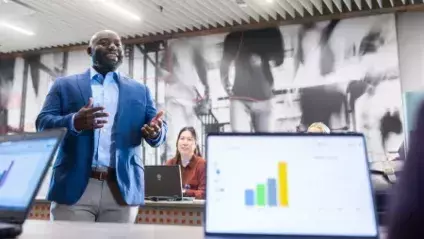Questions? Request Information
Social Science Degree Courses
Your Bachelor of Arts in Social Science online is designed to connect theory with real-world applications, giving you the tools to analyze human behavior, social institutions, and global challenges through multiple perspectives. Your courses will teach you how to examine social problems, evaluate policy, and understand the impact of technology, health, and culture, among other factors, on your community. Each step of your degree journey prepares you with workforce-ready skills needed in policy, research, and nonprofit leadership roles.
Your path to a Bachelor of Arts in Social Science is clear and achievable. To graduate, you will complete 120 credits, including 36 core credits, 43 general education credits, and 53 elective credits. You will need to complete 30 upper-division credits, of which 18 credits must be from the major program. A total of 30 credits must be completed at the University of Arizona Global Campus to meet the residency requirement. You may also be able to transfer eligible credits from prior college coursework, community colleges, military service, professional training, or other approved experiences. All transfer credits are subject to UAGC policies and require official transcripts. Once reviewed, approved credits will be applied to your program, helping you save time, reduce costs, and stay focused on building the career-ready skills employers value.
*In this program, 12 credits from the major may also satisfy General Education requirements.
This program is not designed to meet the state educational requirements for a specific professional license or certification in any state. Students seeking licensure or certification in a particular profession shall carefully research the requirements prior to enrollment and regularly review the requirements as they are subject to change. Requirements vary by state. The University of Arizona Global Campus does not guarantee that any professional organization will accept a graduate’s application to sit for any exam for the purpose of professional certification. Further, a criminal record may prevent an applicant from obtaining licensure, certification, or employment in their field of study.
The Online Teaching Support Certification recognizes programs that require all online faculty to undergo training in best practices for online course delivery, provide faculty with ongoing pedagogical support, encourage faculty professional development to increase their knowledge and skill in online teaching, emphasize instructor availability and feedback to learners, and collect and use feedback from learners to improve online teaching. Learn More

The Online Learner Support Certification recognizes programs that provide all the critical student and academic services needed for learner success and use learner feedback to continuously improve those services.

Customize Your Bachelor of Arts in Social Science with UAGC Emphases
-
Do you have an interest in studying important questions like how a country builds wealth and what policies help economies grow? If so, the Business Economics emphasis may be for you! This emphasis provides the critical knowledge you need to understand the impact of the economy on businesses, individuals, and the global community. Learning economic concepts will assist you in understanding how to analyze scarce resources, how to structure effective consumer incentives, and how public policies may impact an economy. Finally, the Business Economics emphasis includes topics such as profit maximization, international trade, and how to solve contemporary business problems in a global environment. The following courses are a part of the emphasis:
Undergraduate Business Economics Emphasis Courses
ECO 320 International Economics
3 CreditsThis course will focus on the global environment of firms with particular emphasis on economic variables such as GDP, inflation, interest rates, and exchange rates. Topics include international trade, international finance, and regional issues in the global economy.
ECO 406 Business Cycles & Growth
3 CreditsTopics include analysis of economic fluctuations and their impact on corporations and consumers; different explanations for business cycles; monetary and fiscal policy for stabilizing economic fluctuations; effects of public debt, investment, employment and trade policy on economic growth. Prerequisite: ECO 203.
ECO 408 Managerial Economics
3 CreditsThis course will focus on the application of economic principles and analyses to contemporary business problems and managerial decision making. Emphasis will be given to price and production decision making for profit maximization, investment decision making for a new project, strategic decision making in various business situations, and decision making with risks and uncertainty. Prerequisite: ECO 204.
-
The Cognitive Studies emphasis is designed to introduce you to the study of the brain and how we learn, solve problems, and make decisions. You will discover the unique needs of learners with cognitive delays, as well as programs to address those needs. You will also learn to identify changes in brain development over time and analyze their impact on cognitive functions.
Undergraduate Cognitive Studies Emphasis Courses
EDU 411 Reading & Cognition
3 CreditsThe task of learning to read is a very complex process involving the application of perceptual, sensory, linguistic, and cognitive skills to making meaning of text. Exploration of the specific cognitive functions that are applied while reading and strategies supporting reading instruction and reading comprehension skills will be addressed. The implications of digital media on reading skills will also be explored in this course.
PSY 317 Cognitive Functioning in the Elderly
3 CreditsThis course will introduce changes both cognitively and physically, that occur in both healthy and pathological aging. This course will emphasize changes in functioning, learning, language-processing, decision-making, memory, and reasoning in older adults. Prerequisite: PSY 101 or equivalent.
PSY 323 Perception, Learning, & Cognition
3 CreditsStudents will study research and theory about mental processes that go between experience and the human mind. Students will gather and interpret data for several simple experiments that demonstrate classic research findings in perception, learning, and cognition. Perception entails the mental processes involved in the organization and interpretation of sensory experience. Learning entails relatively permanent changes in behavior that result from experience. Cognition explains how the mind processes information, how we encode, store, and retrieve memories, and how we use information to form beliefs, make decisions, and solve problems. Prerequisite: PSY 101 or equivalent.
-
Perhaps you want to be your own boss, or you enjoy out-of-the-box thinking, solving puzzles, resolving problems, and finding creative ways to address issues in the current business environment. The Entrepreneurship emphasis may be just what you are looking for. This emphasis can help you visualize and realize skills you will need to succeed in a global business environment. It enables you to craft a foundation of skills and essential knowledge to build a business from its inception and transform it into sustainable growth. You will learn how to analyze risk, address and analyze the impact of various environmental factors in the political and ethical realm, and learn to design and compile business plans. The following courses are part of the emphasis:
Undergraduate Entrepreneurship Emphasis Courses
BUS 362 Introduction to Entrepreneurship
3 CreditsThis dynamic course is based on a unique model of entrepreneurial methodology . Entrepreneurship encompasses imagining the unknown, taking inspired action, and embracing uncertainty to create a new future. It involves the identification, evaluation, and exploitation of opportunities to address challenges and to solve problems. Students will learn how to use imagination, creativity, innovation, and entrepreneurship to bring new ideas to fruition that inspire others. Students will create a feasible blueprint for a venture opportunity idea of their own. This course will be the beginning of the journey to becoming an entrepreneur.
BUS 433 New Business Strategy
3 CreditsThis course is intended to provide prospective entrepreneurs with information and tools for evaluating opportunities for starting a new firm—how to choose markets for entry, when to enter, and what resources and capabilities it will take to enter and provide a platform for future growth. Prerequisite: BUS 362.
BUS 437 Business Plan Development
3 CreditsBUS 437 students will use prior learning to create a comprehensive business plan for a new venture. The emphasis is on using a systematic four-step method to frame business plan development activities. Each week student teams will develop one segment of the team’s business plan and receive feedback from the instructor through a game simulation. Prerequisites: BUS 362.
-
Do you have an interest in learning how to lead a healthier lifestyle, exploring the benefits of behavior change, and diving into how to better manage stress? If so, the Health and Wellness emphasis may be for you! The Health and Wellness emphasis examines the dimensions of wellness and the relationship of chronic conditions to preventive measures and treatment interventions. This emphasis can help you gain skills to promote health and wellness behaviors on an individual level by evaluating lifestyle factors and developing personalized wellness programs that utilize evidenced-based theories and strategies. The following courses are a part of the emphasis:
Undergraduate Health and Wellness Emphasis Courses
HWE 200 Introduction to Health & Wellness
3 CreditsThis course provides students with a holistic overview of the multi-faceted dimensions of health and wellness across the lifespan. The seven dimensions of health: Physical, social, intellectual, emotional, occupational, spiritual, and environmental are explored within the context of a wellness lifestyle.
HWE 340 Exercise & Physiology
3 CreditsThis course introduces students to physiological responses to exercise in the human body. Students compare the major physiological systems (energy transfer, cardiovascular, respiratory, neuromuscular, etc.) at rest, explain the systemic adaptations that occur with acute and long-term exercise, and evaluate how these activities affect health and human performance. Students also analyze how nutrition and pharmacological aids impact athletic performance.
HWE 415 Stress Management
3 CreditsThis course provides students with a basic understanding of stress management concepts including causes and effects of acute and chronic stress as well as techniques used to manage stress. Students learn about the effects of stress, analyze the relationship between stress and health, apply stress management techniques, and develop stress management programs while considering various cultural backgrounds.
-
In the Real Estate Studies emphasis, you’ll learn the ins and outs of a fascinating industry and prepare for examining the markets and financing methods for residential and commercial properties. Discover the many trends that influence property valuations and learn the best practices to benefit and safeguard investors. These three courses comprise the Real Estate Studies emphasis:
Undergraduate Real Estate Studies Emphasis Courses
RES 301 Principles of Real Estate
3 CreditsThis course introduces students to the general principles of real estate, to include industry terminology, ethics, deeds, listing and purchase agreements, agency, contracts, and property valuation decisions. Emphasis will also be on factors impacting local and national real estate markets.
RES 325 Real Estate Practice
3 CreditsThis course examines the basic job functions of real estate salespersons and brokers. Property listing, advertising, escrow, sales, and establishing a client base will be covered with practical applications for completing successful transactions.
RES 345 Legal Aspects of Real Estate
3 CreditsThis course is a study of the legal system and its impact on purchase, ownership, sale, and leasing of real estate. Topics to be covered include contracts, wills, zoning, and environmental law, as well as Constitutional issues in real estate.
Career Paths with a Social Science Degree
-
Job TitleSalary RangeJob GrowthJob TitleSocial Science Research AssistantsSalary Range$37,080-$96,720Job Growth3-4%

Job Description
Assist social scientists in laboratory, survey, and other social science research. May help prepare findings for publication and assist in laboratory analysis, quality control, or data management.
-
Job TitleSalary RangeJob GrowthJob TitleManagers, All OtherSalary Range$67,370-$225,120Job Growth5-6%

-
Job TitleSalary RangeJob GrowthJob TitleRegulatory Affairs ManagerSalary RangeUnavailableJob Growth5-6%

Job Description
Plan, direct, or coordinate production activities of an organization to ensure compliance with regulations and standard operating procedures.
-
Job TitleSalary RangeJob GrowthJob TitleCompliance ManagersSalary RangeUnavailableJob Growth5-6%

Job Description
Plan, direct, or coordinate activities of an organization to ensure compliance with ethical or regulatory standards.
-
Job TitleSalary RangeJob GrowthJob TitleLoss Prevention ManagersSalary RangeUnavailableJob Growth5-6%

Job Description
Plan and direct policies, procedures, or systems to prevent the loss of assets. Determine risk exposure or potential liability, and develop risk control measures.
Source: Bureau of Labor Statistics, U.S. Department of Labor, Occupational Outlook Handbook at https://www.bls.gov/ooh/community-and-social-service/health-educators.htm (visited August 28, 2025). Salary ranges are as of May 2024, and job growth is the projected percent change in employment from 2024 to 2034. Bureau of Labor Statistics data regarding salary ranges and job growth projections are national in nature and do not guarantee employment, any specific salary, or job growth. Also, national long-term projections may not reflect local and/or short-term economic or job conditions. UAGC does not guarantee employment placement, any specific salary from employment, or career advancement.
Military Students $250.00/credit
Undergraduate Courses $460.00/credit
Technology Fee** $115.00/course
Books and Other Class Materials** $125.00/average per course
Graduation Fee $150.00
Total Program Cost See UAGC Catalog¹

¹ Keep in mind that this figure doesn’t factor in any potential discounts, partner benefits, or impact of accepted transfer credits, if eligible.
Transfer Credits & Admissions
UAGC makes it easy to finish what you started. You can transfer approved traditional credits from accredited institutions, as well as non-traditional credit for military training, work experience, professional development, and nationally recognized prep programs. Maximizing your transfer credit helps you save time, reduce costs, and stay on track to complete your degree faster. Plus, with a $0 application fee and no standardized test requirements, getting started is simple and accessible.



Questions? Request More Information
Meet our Faculty
Expect the highest level of instruction with seasoned faculty who have real-world experience in their fields.
Bachelor of Arts in Social Science FAQs
-
Your Bachelor of Arts in Social Science online prepares you for roles in which data analysis, policy analysis, and human behavior informs your decision-making. Graduates often pursue careers in social services, research, public policy, community development, human resources, and education, where critical thinking, applied research, and similar skills are highly valued. Some specific careers you can consider with this degree include social science research assistant, manager, regulatory affairs manager, compliance manager, and loss prevention manager. You can learn more about occupations related to this field through the Bureau of Labor Statistics Occupational Outlook Handbook.
-
Yes, a Bachelor of Arts in Social Science degree online is worth it. If you are looking for a degree that provides career maneuverability and real-world relevance, a social science degree from the University of Arizona Global Campus will help you develop transferable skills, such as data literacy, problem-solving, and intercultural communication, which employers consistently list as essential for the future of work.
-
The University of Arizona Global Campus is accredited by the WASC Senior College and University Commission (WSCUC). The accreditation means the university meets rigorous academic standards and is recognized across industries and institutions. The Bachelor of Arts in Social Science does not have programmatic accreditation.
-
The Bachelor of Arts in Social Science at UAGC is designed to be completed in 208 weeks. Typically, it takes approximately four years to earn a Bachelor of Arts in Social Science degree online, and students must complete 120-semester credits worth of courses with a portion related directly to the chosen major. The University of Arizona Global Campus offers a flexible online format that helps you balance school, work, and family responsibilities. The online Bachelor of Arts in Social Science is taken one course a time in 5-week terms, and many students can accelerate their path to graduation by transferring eligible college or prior learning credits.
See What Else UAGC Has to Offer
Questions? Request More Information
To access this rate using the Liberty Grant, only eligible undergraduate active duty service members, members of the National Guard, Reservists, spouses of active duty, members of the National Guard and Reservists, Department of Defense employees using Tuition Assistance (TA), and civilian employees of the United States Coast Guard (only if utilizing Military Tuition Assistance) will qualify.
**
The Technology Fee covers access to University systems such as the online classroom, the Student Portal, and other academic resources. The Technology Fee and the Course Digital Materials (CDM) Fee are fully refundable if a student does not attend beyond Day 3 of a course (Week 3 if covered under the University of Arizona Global Campus Promise Refund Schedule). After this time, the fee becomes non-refundable. Students are charged the Technology Fee for repeated coursework. Students are not charged the CDM fee for repeated coursework if previously charged.
†
The transferability of credits is subject to the University of Arizona Global Campus transfer credit policies and requires the submission of official transcripts. The official transcripts will be evaluated by the Registrar’s Office to determine the credits that will officially apply toward a UAGC degree program. Credits must be earned at the same degree level in order to be applied. Additional restrictions may apply. See the UAGC Academic Catalog for full undergraduate and graduate transfer policies.




